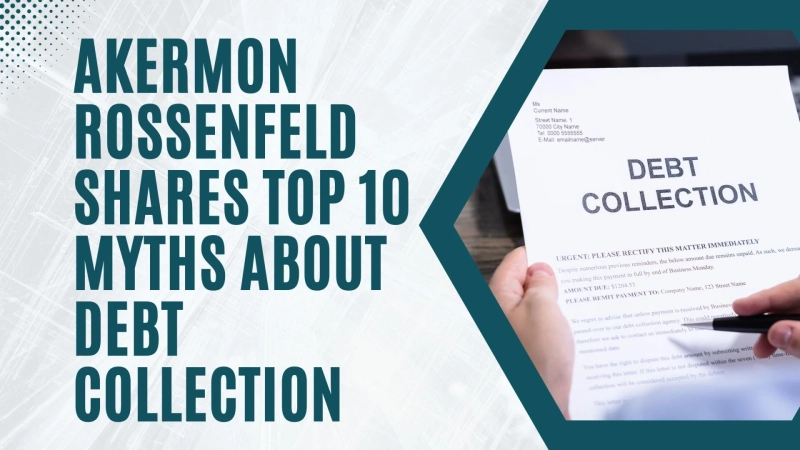Debt collection is a process that often elicits strong emotions and opinions. Many myths and misconceptions surround this industry, leading to confusion and misinformation. Akermon Rossenfeld, a reputable debt collection agency, aims to shed light on the top 10 myths about debt collection to help individuals and businesses better understand the process.
Myth 1: Debt Collectors Can Harass You
One common myth is that debt collectors can harass debtors. In reality, there are strict laws, such as the Fair Debt Collection Practices Act (FDCPA), in place to protect consumers from harassment. Debt collectors must follow specific guidelines when communicating with debtors, including restrictions on calling times and frequency.
Myth 2: Debt Collectors Can Seize Your Property
While it's true that creditors can pursue legal action to recover debt, they generally cannot seize your property without obtaining a court judgment. Debt collectors have limited powers, and seizing property is typically a last resort.
Myth 3: Paying the Debt Collector Will Remove Negative Marks on Your Credit Report
Paying a debt does not automatically remove it from your credit report. The negative information may still appear, but it will reflect that the debt has been paid, which can be less damaging to your credit score than an unpaid debt.
Myth 4: Debt Collectors Can Call You at Any Time
Debt collectors must adhere to specific calling hours established by the FDCPA. They cannot call you early in the morning or late at night, and they cannot call you at work if you've asked them not to.
Myth 5: Debt Collectors Can't Be Negotiated With
Debt collectors are often open to negotiation. If you're unable to pay the full debt amount, you can typically work out a repayment plan with them. Being proactive and communicative can help you find a solution that works for both parties.
Myth 6: Debts Expire After Seven Years
While it's true that most negative information remains on your credit report for seven years, it doesn't mean the debt magically disappears. Creditors can still attempt to collect on the debt after the seven-year mark.
Myth 7: Debt Collectors Can Arrest You
Arresting someone is not something that debt collectors are allowed to do. Arrest-related threats are against the law and an FDCPA violation. The process of collecting debt is a civil, not a criminal, affair.
Myth 8: Ignoring Debt Collectors Will Make Them Go Away
Ignoring debt collectors can have serious consequences. The debt won't disappear, and legal action may be taken against you. It's always better to communicate with debt collectors and address the issue directly.
Myth 9: All Debt Collectors Are Unscrupulous
While there have been instances of unethical debt collectors, not all agencies operate in this manner. Reputable agencies like Akermon Rossenfeld prioritize ethical practices and compliance with debt collection laws.
Myth 10: You Can't Dispute a Debt
You have the right to dispute a debt if you believe it is incorrect or if you've already paid it. Debt collectors must provide validation of the debt, and you can dispute it if you think there's an error.
In conclusion, understanding the truth behind these common myths about debt collection can help individuals and businesses navigate the process more effectively. Debt collection is a complex field with rules and regulations designed to protect both debtors and creditors. By addressing these myths and misconceptions, the Akermon Rossenfeld Agency aims to promote transparency and responsible debt collection practices. If you're facing debt collection issues, it's essential to seek professional guidance and know your rights to ensure a fair resolution.


